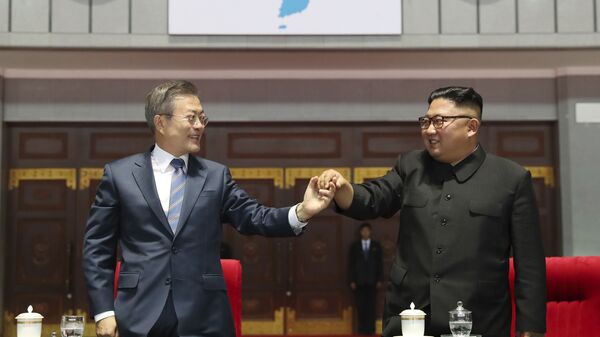"Our basic stance is that North Korea-US talks and inter-Korean dialogue complement each other in a virtuous cycle,” Kang said following a Tuesday meeting with US Secretary of State Mike Pompeo and other diplomatic counterparts from the US and Japan, as reported by Reuters.
She explained that while dialogue between Pyongyang and Seoul is not completely dependent on the progress of the US and North Korea’s denuclearization negotiations, it would benefit all involved to renew "North Korea's engagement momentum" through the peninsula’s peace talks.
Kang’s remarks in Palo Alto, California, came just hours after South Korean President Moon Jae In rejected reports of Washington stalling potential cooperation between the two Koreas.
"We are not at the stage for now to be pessimistic about South-North dialogue and North Korea-US dialogue, although it's not at a stage to be optimistic," he said during a New Year’s press conference in Seoul on Tuesday. The South Korean president has also extended an invitation for North Korean leader Kim Jong Un to revisit Seoul in the coming months.
The Korea Times reported that South Korean Unification Minister Kim Yeon Chul expressed his commitment to exploring additional “active efforts in improving inter-Korean relations” during a Tuesday luncheon with pro-unification groups. He also revealed that Seoul is prepared to take a more “flexible” approach with Pyongyang in order to promote peace talks on the peninsula.
In September 2019, inter-Korean relations had mended so much that Moon and North Korean leader Kim signed an end-of-war declaration for the 1950-53 conflict and took unprecedented steps toward removing travel and trade barriers between the two countries, which have been split since the end of World War II. The Soviet Union liberated the northern half of Korea from Japanese rule before the Japanese Empire surrendered to the Allies in August 1945, leaving the United States in control of the southern half. The two global superpowers built new states on the peninsula along their own ideological lines: a communist north and a capitalist south.
A technical state of war has persisted between the north, which is formally called the Democratic People’s Republic of Korea (DPRK) on one side, and the Republic of Korea (South Korea) and the US on the other, since the Korean War broke out in 1950. The shooting war ended in 1953 with a ceasefire agreement establishing the Demilitarized Zone separating North and South, but no permanent peace treaty.
As for the US’ approach, the US Department of the Treasury’s Office of Foreign Assets Control introduced sanctions against Korea Namgang Trading Corp and Beijing Sukbakso on January 14, noting that their “exportation of North Korean workers raises illicit revenue for the government of North Korea in violation of UN sanctions," according to Treasury Secretary Steve Mnuchin.
Despite the sanctions-related crackdown and Kim’s vow to continue weapons development, the Trump administration is also calling for the DPRK to return to the negotiating table.
"We've reached out to the North Koreans and let them know that we would like to continue the negotiations in Stockholm that were last undertaken in early October," White House national security adviser Robert O'Brien revealed earlier this week.




